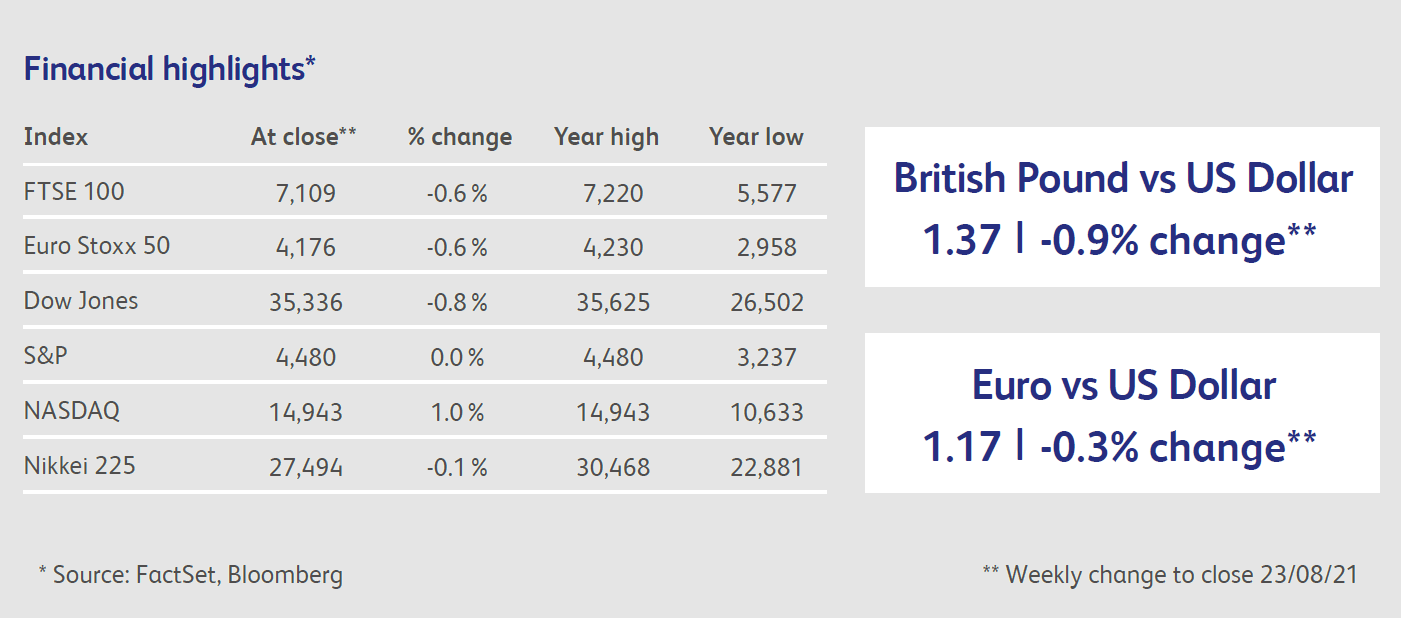
24 August 2021
Will they, or won’t they? Investors, analysts and commentators were left none the wiser about the fate of the US Federal Reserve’s enormous asset purchase programme, after the minutes to its latest meeting were released. The fact that “tapering” its asset purchase is even being actively discussed was enough to deter US government bond markets initially, and to give the dollar a boost. However, as has happened so often during the pandemic, the dip was swiftly bought, with the explanation being that the start of tapering asset purchases may be further off than expected. Equity markets were similarly confused, initially selling off by a couple of percent before gaining most of it back.
Should investors be weighting portfolios towards Environmental, Social and Governance (ESG)-friendly investments? With extreme weather events affecting the harvests of coffee, corn, wheat and sugar this year, sending their commodity-market prices soaring, and with wildfires and other extreme weather-events becoming seemingly commonplace, it’s natural to want to respond. Moreover, performance of ESG-friendly funds has been strong over the past several years, though that is more to do with their relatively large allocations to the technology sector than their inherent ESG qualities. Even central banks are getting in on the act – last month alone, the European Central Bank set out plans to involve climate change considerations in its analysis of the economy and financial markets, and the Bank of Japan published a climate change strategy, in which it will purchase foreign currency-denominated green bonds issued by governments and other foreign institutions.
Ultimately, all types of risk end up being financial if they cause asset prices to fluctuate. The ESG concept isolates and unites particular sources of risk under a common banner, which is increasingly being championed by governments, the financial services sector and regulators worldwide. It’s not unusual for major risks to attract this level of attention – witness the pandemic stimulus programmes that united governments and central banks in a co-ordinated policy response. The difference is that the “E” in ESG is going to be with us for a very long time. Unlike social and governance issues, climate-related risks have potentially profound and wide-ranging consequences for asset prices.
The good news is that these will most likely unfold over a long horizon, giving investors the ability to react appropriately. Financial theory says that competitive markets are very quick to assess and incorporate threats and opportunities, so it should not be easier to earn returns in ESG investments than in any other sector. But it’s worth considering the risks and potential rewards that are specific to this sector, and which make it so distinctive. One is the pace of climate change itself which, if it becomes very volatile, raises the risk of abrupt, unforeseen shifts in government policies. These would be reflected in increasing volatility of prices of fossil fuel-dependent industries as well as of green champions.
Another distinct risk is whether, and how, societies adapt to the long-term goal of a zero-emissions world. After all, adapting to the post-Covid world isn’t exactly going smoothly. Last week the US Food and Drug Administration issued an unusual warning to Americans who had avoided Covid vaccines in favour of taking drugs used against parasites in livestock: “You are not a horse. You are not a cow.”

More than any other company, Robinhood Markets epitomises the current speculative fervour among American retail investors. Rather than holding meetings for selected professional analysts after its results are announced, Robinhood invites retail investors to attend. Last week, it warned that a boom in cryptocurrency trading, which generated more revenue for the company than stock and option-trading combined, might not last: “We expect seasonal headwinds and lower trading activity across the industry to result in lower revenues and considerably fewer new funded accounts”. The shares tumbled 10% on the news.
China has passed legislation setting out tougher rules for how companies handle user data, pushing forward its campaign to curb the social influence of technology companies. Early drafts of the new Personal Information Protection Law required firms to get user consent to collect, use and share information, and to provide a way for them to opt out. Companies found breaking the rules could face fines of up to 5% of their annual revenue.
Already under regulatory scrutiny from their own government, Chinese internet companies are now facing similar pressure in the western world. Chinese taxi app and Uber-rival Didi Global is reported to have suspended plans to launch in the UK, after having already secured licences to operate in Manchester, Sheffield, Salford and Wolverhampton. The move is thought to be connected with the possession of client data. A group of MPs had already questioned whether Didi’s UK customer data would be available to Chinese authorities.
Unilever and Diageo are in the naughty corner. Having been suspended in 2019 from the government’s Prompt Payment Code, designed to promote the fair treatment of suppliers (especially smaller ones), they have since failed to improve the speed of their payments terms enough to merit re-inclusion. They face expulsion from the Code.
Highlights
Calendar
Markets will be glued to the TV while US Federal Reserve Chairman Jerome Powell gives his speech at the annual gathering of central bankers and finance ministers at Jackson Hole. However, it’s unlikely that he will break new ground, and is expected to reiterate his view that the increase in inflation will be transitory and that the Fed wants to see more data before starting to wind down its asset purchase programme.
This publication is intended to be Walker Crips Investment Management’s own commentary on markets. It is not investment research and should not be construed as an offer or solicitation to buy, sell or trade in any of the investments, sectors or asset classes mentioned. The value of any investment and the income arising from it is not guaranteed and can fall as well as rise, so that you may not get back the amount you originally invested. Past performance is not a reliable indicator of future results. Movements in exchange rates can have an adverse effect on the value, price or income of any non-sterling denominated investment. Nothing in this document constitutes advice to undertake a transaction, and if you require professional advice you should contact your financial adviser or your usual contact at Walker Crips. Walker Crips Investment Management Limited is authorised and regulated by the Financial Conduct Authority and is a member of the London Stock Exchange. Registered office: Old Change House, 128 Queen Victoria Street, London, EC4V 4BJ. Registered in England and Wales number 4774117.
Important Note
No news or research content is a recommendation to deal. It is important to remember that the value of investments and the income from them can go down as well as up, so you could get back less than you invest. If you have any doubts about the suitability of any investment for your circumstances, you should contact your financial advisor.